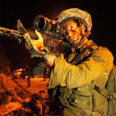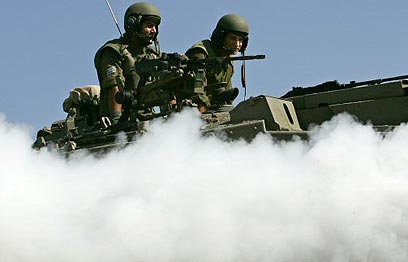
War in north
צילום: איי פי
What about proportionality?
Israel’s critics seem to miss a crucial point: Although rules, norms of international conduct in armed conflict apply to a sovereign state, they do not bind a non-state player such as Hizbullah
Much has been said and written in recent days about the issue of proportionality in armed conflict in the context of Israel’s response to Hizbullah’s unprovoked across-the-border attack. No cogent argument can be made for or against Israel unless we first consider the three fundamental principles of a just war and then how the doctrine of proportionality applies in such a situation.
These principles are: 1) adherence to norms and rules that guide international conduct in armed conflict, 2) discrimination in the execution of the war to prevent collateral damage, and 3) creation of better conditions than those existing before the eruption of hostilities and prevention of renewed violence.
Everyone who is not an extremist agrees that, according to Article 51 of the UN Charter, Israel has the right to defend itself. The question is whether Israel, as many, including UN Secretary General Kofi Annan, charge is using excessive or disproportionate force relative to Hizbullah’s provocations, which inflicted and continue to inflict undue harm on Israel’s civilian population.
Asymmetry
Here, Israel’s critics seem to miss a crucial point: although the rules and norms of international conduct in armed conflict apply to a sovereign state, they do not bind a non-state player, in this instance, a terrorist organization, such as Hizbullah.
Moreover, sharing the same fervent religious faith, Hizbullah operates mostly at the behest of the Iranian government, whose president has repeatedly called for Israel’s elimination. Hizbullah is thus complicit to Iran’s designs and a willing participant in their implementation.
This asymmetry challenges the premise of proportionality as articulated by Israel’s critics, because it must respond not only to the current provocation but to the much larger looming threat that Hizbullah and Iran pose to Israel’s very existence.
This argument of course does not exempt Israel, or any other aggrieved party, from indiscriminately conducting a military campaign that causes the death of innocent civilians. Yet, here too, Israel’s accusers are pointing to the truly horrific pictures of and reports about Lebanese men, women, and children caught, through no fault of their own, in a deadly conflict, without paying much attention to the causes of their tragic plight.
War is ugly
Israel sees this conflict as existential and is determined to destroy Hizbullah as an armed militia. But it has been Hizbullah’s strategy to hide behind women’s skirts and use children as human shields. Most of its arsenals are hidden in civilian-populated areas in southern Lebanon and southern Beirut, where its fighting men are also totally imbedded.
While Israel drops hundreds of thousands of leaflets and makes radio announcements and telephone recordings warning civilians to leave before any air strike, Hizbullah’s leaders encourage their people to stay put to deliberately increase civilian fatalities and so create international condemnation of Israel.

War in north (Photo: Reuters)
War, under the best of circumstances, is ugly, and with the best of intentions innocent people die. But no Lebanese would have died if Hizbullah’s blind leaders had not been operating under a deadly illusion that has led to the sacrifice of their young followers and disaster to their nation.
The questions now are how this unfortunate war should end and what measures are necessary not simply to prevent a repetition but to produce conditions in which Lebanon, Israel, and the whole region can benefit.
First, it is necessary to dismantle Hizbullah as an armed militia, disarming it totally, in accordance with UN resolution 1559. Although the international community should never allow Hizbullah to reconstitute its military arm, Hizbullah could continue to exist as a political party.
This outcome will dramatically diminish Iran’s influence in Lebanon and impede its ability to undermine future Israeli-Palestinian peace negotiations. Such an outcome will enhance Lebanon’s democracy, restore its territorial integrity and potentially usher in a permanent calm on its border with Israel, if not peace.
Sunni interest
In addition, this outcome will also be most welcome, not only in Lebanon but in the predominantly Sunni Arab states such as Saudi Arabia, Egypt, and Jordan, which feel threatened by the rise of the Shiites in Iraq and by Iran’s growing regional assertiveness and potential nuclear threat.
The creation of a crescent of more than a 100 million Shiites, extending from the Persian Gulf to Lebanon, stirs tremendous anxiety in these and other Arab Sunni states, many of them viewing the battle in Lebanon as part of their own battle against the Shiites which transcend Iraq and which explains their relative silence regarding the current swirling events.
Should this development come to pass it will not, in itself, bring stability to the Middle East. While destroying Hizbullah as a military entity can diminish Iran’s influence in Lebanon, the organization’s other main supporter, Syria, will not be similarly affected.
Damascus’ interest has been, and will always be, the recovery of the Golan Heights. Whereas Syria can adjust to losing much of its influence in Lebanon, no Syrian government, led by a democratically elected leader or a despot, will rest until the Golan is back on the international agenda and the prospect of recovering it from Israel becomes real. Therefore, regardless of Hizbullah’s fate, Syria remains perfectly capable of being the regional spoiler.
The Syrian option
In exchange for breaking its axis with Iran, severing ties to various Palestinian militant groups, notably Hamas, and rejoining the Arab Sunni fold, Damascus wants the United States to pay serious attention to Syria’s national economic and security interests.
This is why the Bush administration must break loose from its taboos about dealing with Syria and begin a dialogue with the potential of changing dramatically the political landscape of the entire region. This is particularly important in view of the chaotic situation in Iraq and the failure of the American drive to introduce democracy in the Arab and Muslim states.
The senselessness of this war deeply saddens me. But it will be utterly in vain if the main players do not attempt to take from its ashes something that benefits the region and its people. Israeli “proportionate” response or a premature ceasefire which allow Hizbullah to survive with much of its arsenal intact will invite a replay of recent events only with greater tragedies and human suffering.
Alon Ben-Meir is professor of international relations at the Center for Global Affairs at NYU and is the Middle East Project Director at the World Policy Institute, New York.










